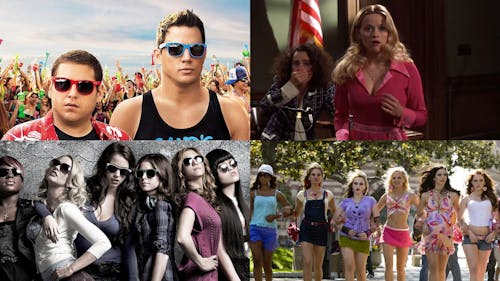TANG: Movies misrepresent college experience

College is often depicted as a carefree adventure filled with wild parties, lifelong friendships and spontaneous road trips. Films like "22 Jump Street" and "Legally Blonde" display university life in an exciting way and set high expectations for incoming students. But the cinematic portrayal fails to highlight what college entails.
The reality is that students face intense academic pressure, financial burdens and complex social relationships that can often feel isolating. The difference between how Hollywood portrays college and its reality is that, although college can be a transformative experience, it is usually not as glamorous as the movies suggest.
College academics are more demanding than they appear in films. A survey reports that the top stressor for students is the pressure to do well, specifically keeping up and performing well on exams. Academic pressure in college can be overwhelming, far exceeding what students expect from their experience. Not to mention, for incoming students, the shift from high school to college not only involves more course material but also a need for a deeper understanding of course content.
In "Legally Blonde," Elle Woods navigates the challenges of Harvard Law School with flair and minimal struggle while balancing both a perfect social and academic life. But the unrealistic aspect of it all is her balancing everything effortlessly.
Many real-life students struggle with sleepless nights, overwhelming workloads and anxiety. The film simplifies the college experience, implying that success comes with a little determination when, in reality, one needs more than that to thrive.
Tuition fees have skyrocketed recently, causing many students to take on heavy student loans. While movies often portray college life as careless adventures, they fail to address the reality of budgeting for textbooks, housing and meals.
Research shows that in 2018, 81 percent of part-time undergraduates and 43 percent of full-time undergraduate students were employed. Students often need to juggle jobs and their studies to make ends meet, sacrificing study time and social opportunities.
In "The House Bunny," Shelley freely spends money on lavish parties and designer outfits to bestow upon the socially awkward girls in her sorority, free of charge. Thus, this creates an idealized version of student life, where financial worries cease to exist. This representation creates a divide in the college experience because it overlooks the reality that many students cannot afford the same luxuries.
For students with jobs or student loans, these films can create a sense of alienation because they can leave them feeling excluded from experiences that seem to be standard. This contrast between the two realities highlights how financial disparities shape social interactions and create barriers among students.
In movies, college friendships are seen as effortless and instantly fulfilling, with characters easily bonding over shared experiences. Films like "Pitch Perfect" portray tight-knit groups that go through challenges together, but these portrayals romanticize college relationships, showing that friendships form quickly and organically while being naturally supportive.
The reality is that many students face difficulty finding meaningful relationships. Unlike the films, real-life relationships require nurturing, time and effort to develop. 71 percent of students find it hard to form deep relationships, 69 percent have social anxiety and 27 percent live at their childhood home while going to college.
The multitude of interpersonal and social issues are heightened when considering commuter students.
In 2010, the University of Arizona studied commuters, reporting that during the semester, 39 percent of commuters participated in on-campus activities "a few times," while 19 percent reported never participating in any on-campus offerings.
In my experience, being a commuter makes it hard to make friends because you miss out on spontaneous interactions on campus and have limited bonding opportunities outside of the classroom. Overall, there seems to be a disconnect from campus culture, amplifying the feeling of isolation.
The portrayal of college life in movies creates an unrealistic reality that overlooks students' struggles. The reality is far more nuanced than the picture-perfect experiences shown on the screen. While all these films are entertaining and show some accurate depictions of college life, they fall short of capturing the stress, effort and isolation that shape the true college experience.
Acknowledging these flaws encourages empathy for all students as they continue on this transformative journey.
Kelly Tang is a junior in the Rutgers Business School majoring in Finance and Supply Chain Management. Tang’s column, “Don’t Get Me Started,” runs on alternate Wednesdays.
*Columns, cartoons, letters and commentaries do not necessarily reflect the views of the Targum Publishing Company or its staff.
YOUR VOICE | The Daily Targum welcomes submissions from all readers. Letters to the editor must be between 350 and 600 words. Commentaries must be between 600 and 900 words. All authors must include their name, phone number, class year and college affiliation or department to be considered for publication. Please submit via email to oped@dailytargum.com and eic@dailytargum.com to be considered for publication.



